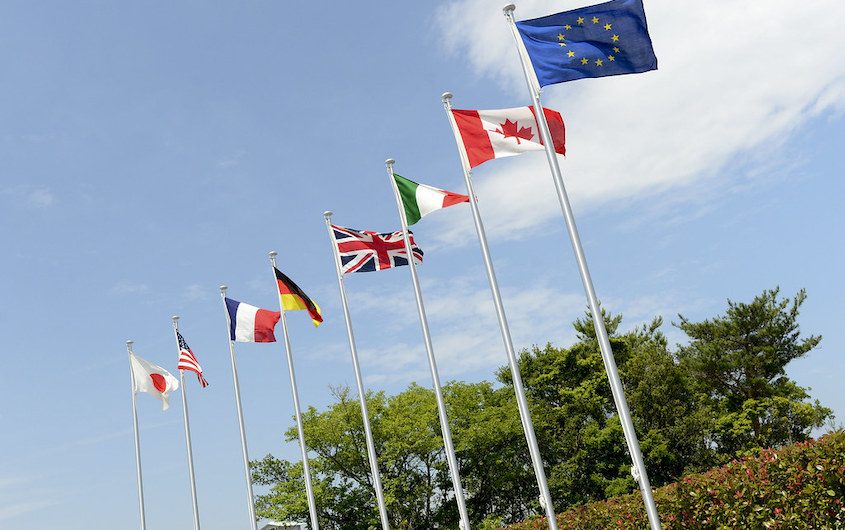
Number 10 via Flickr
Unforeseen Challenge for Germany’s G7 Presidency: Time for a Comprehensive Perspective

Andreas Freytag
Friedrich-Schiller-University Jena
Dr. Andreas Freytag is Professor of Economics at the Friedrich-Schiller-University Jena, Honorary Professor at the University of Stellenbosch, and Visiting Professor at the Institute of International Trade, University of Adelaide. He is also Director of G20 Trade and Investment Research Network. He is a DAAD/AGI Research Fellow in October and November 2023.
Dr. Freytag obtained his diploma from the University of Kiel and his doctorate as well as his Habilitation from the University of Cologne. He has published a number of books and articles in first-class peer-reviewed journals on economic policy, international trade policy, development economics, and international policy coordination. He contributes to blogs and for over ten years had a weekly column on wiwo-online, a German magazine.
During his time at the AGI, Andreas Freytag will focus on the substance and path of tightened transatlantic relations against the background of the systemic competition between the West and autocratic states. The latter comprise some emerging economies, including Russia and China. This escalation has geo-political and geo-economic consequences and makes it necessary to strengthen the ties between transatlantic partners as well as to reach out jointly to attract third countries to the Western values.
To maintain Western leadership in standard-setting as well as helping developing countries to enforce universal human rights and environmental standards, there needs to be a coordinated and broad-based strategy to (1) react to Chinese et al. attempts to define and set standards, which become binding for third countries’ companies. Similarly, (2) due diligence legislation may also be more effective if coordinated across the Atlantic. Although not in the center of analysis, another (3) aspect deals with the transatlantic trade relations as such, which are also in need of a revitalization.
This project focuses on the geo-economic aspects of systems competition although it is difficult to disentangle economic and political relations. It analyzes ways to intensify the transatlantic relations with the objective to maintain economic welfare as well as to position the Western partners better to counter autocracies’ attempts to gain influence in the world economy.
The Problem of Thinking in Silos
In January 2022, the German government published its policy priorities for the G7-Presidency of this year. They are sensible and well placed. In fact, the German government wants “… to deliver progress towards:
- A sustainable planet,
- Economic stability and transformation,
- Healthy lives,
- Investment in a better future,
- Stronger together …”
The last four weeks have demonstrated that all these objectives are more important than ever. However, these four depressing weeks have also shown that the German government and its predecessor have not been fully up to the task. The main reason is the inability of the administration to see the strong linkages between different policy areas. For too long, German governments treated policy areas independently from each other. Policymakers tended to think in silos instead of taking a comprehensive perspective.
For instance, it was a serious flaw to judge energy policy decisions—namely to give up nuclear power and to rely on gas as the transformative technology towards greening energy supply—in isolation from the geopolitical setting. Whereas the treatment of energy policy as an economic issue may work well between like-minded democracies, this does not work when you deal with a murderous dictator, even if he disguises himself as a quasi-democrat. Even today, leading German politicians think they would be asking too much of the electorate if they called for cutting Germany off Russian gas supply as part of the sanctions regime. The population is ahead of the politicians: in a survey from March 10, a majority favored a total gas and oil boycott against Russia.
Another example for thinking in silos is the lack of interaction between German climate policies and development cooperation. The latter is still seen as a kind of paternalistic charity towards crisis-ridden developing countries, who have to be taught to adhere to human and social rights, if necessary with the help of due-diligence legislation. With this approach, the government overlooks the potential of African partners to contribute, in particular in the areas of climate protection as well as energy demand. Moreover, it fails to open markets for German businesses that may soon find themselves stripped of lucrative input markets in Russia and export opportunities in China and other countries that do not adhere to German human rights standards (once the due-diligence laws take effect).
That said, today one can easily see multiple and complex linkages between foreign policy, development cooperation, climate protection, and economic policy. The more complex the problems become, the more the government should not only acknowledge these linkages, but also act on them—which is more difficult. The effects of comprehensive policymaking would be even stronger if it were coordinated among like-minded countries such as G7 members.
After February 24, 2022, the World is Different
On February 24, 2022, the domestic and global policy agenda of the Traffic Light coalition became apparently outdated. As
Next, the German government now has the additional obligation to readjust its policy stance towards interlinked issues and to think in a long-term comprehensive framework. The G7 Presidency offers a unique opportunity to address these problems and contribute to the objectives laid out in the German priorities presented above. The first step to meeting these objectives is a fast and definite end to the barbaric war in the Ukraine. For this to happen, the G7 must use all reasonable instruments, which include a complete stop of trade with Russia and a clear announcement to sanction those who undermine the sanctions against Russia. The German government should take the foot off the brake!
Further steps should unleash international economic dynamics and make supply chains work again. This requires a more stable security architecture as a basis, to which Germany now seems willing to contribute. In addition, the G7 should take actions to dismantle tariff barriers, to reduce subsidies, and to strengthen global governance, with respect to trade, international finance, and climate protection. The G7 countries should not give in to the impulse to instead raise barriers, protect domestic industries, or even ban agricultural exports. They should intensify mutual trade relations and engage more actively, both with developing countries—in particular in Africa—and among themselves, especially against the background of the strategic rivalry with China.
One Example: Initiating a Strategic Partnership with African Countries
With the Russian invasion of Ukraine, food security is now at the top of the agenda. With that in mind, the G7 Presidency offers the opportunity to intensify relations with African partners through a strategic partnership that could include:
- opening their markets to African food producers;
- concluding a strategic investment partnership agreement including (but not limited to) agriculture to foster investment in competitive and efficient cash crop production in Africa. This would reduce African dependency on wheat and other crops from Russia and the Ukraine. In any case, it would help to feed the poorest;
- developing a sustainable due diligence governance pattern that does not distort global value chains by driving Western companies out of Africa, but rather helps African nations to improve their institutions so they can so they can better respect human rights and civil liberties in the medium and long run.
Conclusion
The Russian invasion has not made the German G7 priorities obsolete—quite the contrary. However, it also made clear that the cosy post-Cold-War era, which mainly demanded economic policy coordination, is over. It has also demonstrated clearly that the complexity of the current world order demands a comprehensive perspective. Individual policies such as trade or development policy can no longer be conducted and analysed in isolation. They are deeply linked with each other and require a strategic answer, ideally in cooperation with likeminded governments whileincludingas many developing countries as possible. The G7 Presidency offers the German government the opportunity for a paradigmatic change.








